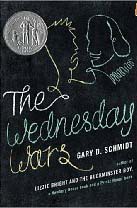
 The Wednesday Wars
The Wednesday Wars
Review posted January 23, 2009.
Clarion Books, New York, 2007. 264 pages.
Starred Review.
Sonderbooks Stand-out 2008: #2, Children's Fiction
Of all the kids in the seventh grade at Camillo Junior High, there was one kid that Mrs. Baker hated with heat whiter than the sun.
Me.
Holling Hoodhood knows that the teacher has it in for him because he’s the only kid in his class who doesn’t spend Wednesday afternoon either at Hebrew School or Catechism at the Catholic church. Instead, Holling is stuck with Mrs. Baker, and Mrs. Baker is stuck with him.
This book reminds me of The Absolutely True Diary of a Part-Time Indian. Both books look at the difficulties, dramas and dilemmas of student life with a large dose of humor. Mind you, Holling’s difficulties are not as dire as those of Junior in the Absolutely True Diary. However, he has some notable challenges, perhaps slightly on the bizarre side—involving rats, cream puffs, a fairy, baseballs, and William Shakespeare.
I love the scene where Holling meets the principal, because it sounds so true to what a principal would say:
I had to wait outside the door. That was to make me nervous.
Mr. Guareschi’s long ambition had been to become dictator of a small country. Danny Hupfer said that he had been waiting for the CIA to get rid of Fidel Castro and then send him down to Cuba, which Mr. Guareschi would then rename Guareschiland. Meryl Lee said that he was probably holding out for something in Eastern Europe. Maybe he was. But while he waited for his promotion, he kept the job of principal at Camillo Junior High and tested out his dictator-of-a-small-country techniques on us.
He stayed sitting behind his desk in a chair a lot higher than mine when I was finally called in.
“Holling Hood,” he said. His voice was high-pitched and a little bit shrill, like he had spent a lot of time standing on balconies screaming speeches through bad P.A. systems at the multitudes down below who feared him.
“Hoodhood,” I said.
“It says ‘Holling Hood’ on this form I’m holding.”
“It says ‘Holling Hoodhood’ on my birth certificate.”
Mr. Guareschi smiled his principal smile. “Let’s not get off on the wrong foot here, Holling. Forms are how we organize this school, and forms are never wrong, are they?”
That’s one of those dictator-of-a-small-country techniques at work, in case you missed it.
“Holling Hood,” I said.
“Thank you,” said Mr. Guareschi.
Set against the backdrop of the Sixties, this is an entertaining and touching story about being a kid and finding your way in life.
I like the way Mrs. Baker sums up Shakespeare:
“Shakespeare did not write for your ease of reading,” she said.
No kidding, I thought.
“He wrote to express something about what it means to be a human being in words more beautiful than had ever yet been written.”
“So in Macbeth, when he wasn’t trying to find names that sound alike, what did he want to express in words more beautiful than had ever yet been written?”
Mrs. Baker looked at me for a long moment. Then she went and sat back down at her desk. “That we are made for more than power,” she said softly. “That we are made for more than our desires. That pride combined with stubbornness can be disaster. And that compared with love, malice is a small and petty thing.”

 The
Wednesday Wars
The
Wednesday Wars